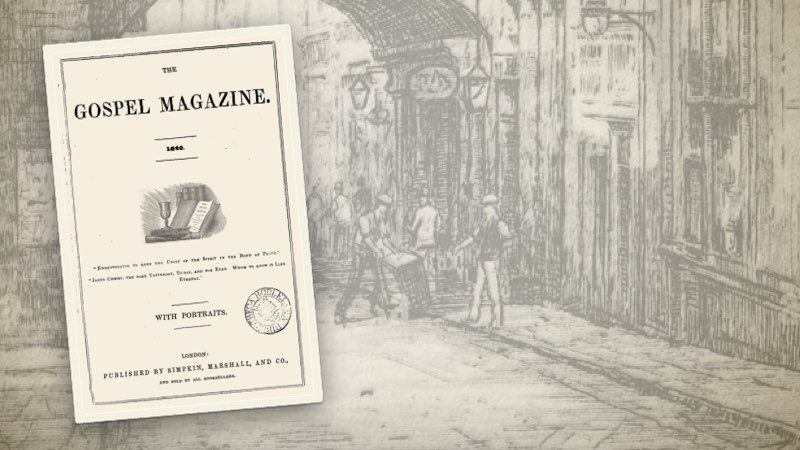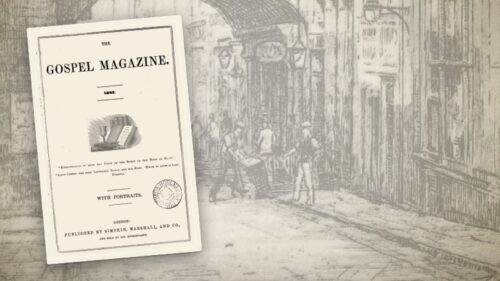
The Two Preachers
Gospel Magazine 1766:
The Moral Preacher
The smooth-tongu’d, moral preacher thus begins:—
Repent, believe, leave off your former sins;
Attend the worship of the temple true,
And see you give to ev’ry man his due.
Bestow your alms likewise when you see need,
The naked clothe, the hapless orphan feed.
And when you fail (for all come short sometimes),
Repent again; be sorry for your crimes.
Thus if from day to day you ever live,
Depend upon it, God will you forgive.
Mind not what preachers do, but what they say;
And safe to heav’n this will your souls convey.
Then think with what serenity of mind
You may at death leave this vain world behind.”
The Effect
With what applause this doctrine is receiv’d,
And by their practice how it is believ’d
Is plainly seen by the unthinking throng,
Who praise the preacher with united tongiu.
But if the applauding hearers we inspect,
We soon shall see how they these rules neglect;
Their base, immoral lives most faintly show
They practise not, nor think the doctrine true.
Yet nothing suits the nat’ral man so well,
As by his works to save himself from hell;
And when he fails, he thinks he can repent,
Give God his due, and rest with heart content.
Thus in the path that leads to endless woe
The poor deluded wretches daily go.
The Gospel Preacher
But lo! the gospel-preacher, he begins
To show the people their enormous sins,
And having open’d his divine commission,
He shows by nature man’s undone condition;
And that he may their due attention draw,
He opens first God’s pure, unchanging law,
Which doth a most tremendous curse denounce
On ev’ry soul of man that sins but once;
And that it never will revoke the sentence,
For all their bitter cries and deep repentance.
For ever doth this perfect law declare
To ev’ry sinner death and dire despair.
The hearers, thus alarmed, begin to cry,
“What must we do, or whither shall we fly?”
The preacher now perceives an op’ning wound;
Then lo! he probes it deep to make it sound;
And having searched the bottom well, he lays
A healing plaster on to give it ease
Namely, the Saviour’s all-atoning blood,
The only balsam that can do it good.
This being by the Holy Ghost apply’d,
The wound is heal’d, the sinner’s justified.
And here the true believer’s peace begins:
He now beholds, abhors, and leaves his sins;
For here he sees them wholly wash’d away
In Jesus’ blood, that rich, that boundless sea.
And thus the wounded spirit ease receives
Soon as the blessed gospel he receives.
The Effect
The sinner thus convinc’d and justify’d,
By being with a righteousness supplied
Without his works, what must be the effect?
May he not then all duties quite neglect,
Live as he list, and take his fill of sin,
Nor fear the speaking monitor within?
Doth not this doctrine lead to mad excess,
And give a loose to all licentiousness?
No; far from this. To whom there’s much forgiv’n
By free donation of indulgent Heav’n,
Loves much, and would not in the least presume
To grieve his gracious Lord for time to come;
But doth with joy in paths of duty run,
Not like a slave, but an obedient son.
This is the effect on all whoe’er believes,
And cordially the word of truth receives.
But whoso dare this gospel-grace abuse,
It with the fullest demonstration shows,
That they a pardon free have not receiv’d,
Nor yet aright in Christ the Lord believ’d;
But still are bound in Satan’s cruel chain,
Under God’s wrath, not being born again.
Such is the effect the gospel preach’d affords;
Not by man’s will and wisdom, but the Lord’s.
To some it proves a savour unto life;
To others death, through unbelief and strife.
But all doth God’s sublime decree fulfil,
Who orders all things by his righteous will.
The Application
Then, O thou man of God, hold not thy peace,
But preach the truth, nor fear thy bad success;
For as the snow that cometh down from heav’n,
And rain to fructify the earth is giv’n:
One precious drop descendeth not in vain
On barren heath, or on the fruitful plain.
Though sent with different ends for different use,
Each doth its proper vegetives produce.
The one brings forth enriching crops of corn;
The other noxious brambles, brier, and thorn;
Yet all according to divine command.
None can resist the great Creator’s hand;
And so his precious word, where’er ’tis sent,
Shall fully answer his divine intent.
It may be argued the Strict and Particular Baptist churches of the 17th, 18th and early 19th centuries were at their strongest when they remained independent congregations, unaffiliated with Magazines and Societies. This strength was lost during the latter half of the 19th century when the churches clamored around favorite periodicals and regional associations. Although the Magazines were largely responsible for creating a party-spirit and culpable for stirring up needless controversy, they nevertheless contain many valuable resources which may prove a blessing for this generation. Although they differed on various points of doctrine, they invariably held to high views of sovereign grace, denouncing as heresy the pernicious teachings of Andrew Fuller. The majority of Strict and Particular Baptist churches during the 18th and 19th centuries were Hyper-Calvinists.




